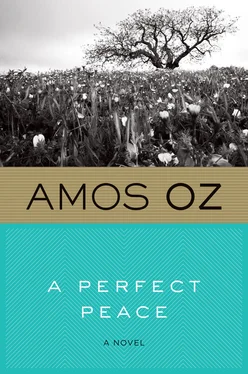No! Absolutely not! He didn't even want to hear about it. Running the tractor shed was not for him. He had work in the citrus groves and there was still the grapefruit to get in. "When it stops raining, I mean. Today, of course, we couldn't pick, but as soon as it clears we'll start again. And besides, the tractor shed — what do I have to do with tractors?"
"That's something totally new," said Yolek. "Nowadays no one wants to work in the tractor shed. Mazel tov. Some years ago we had fierce battles around here because everybody wanted to be nothing less than a mechanic, and now suddenly working with nuts and bolts is beneath all of you. Scyths! Huns! Tatars! I don't mean you personally. I'm talking in general. Look at your young Labor Party hacks. Look at your young littérateurs. Never mind. All I ask is that you take over the shed for as long as it takes to find a permanent solution. And if I ask such a favor from you, I expect you to give me better reasons for refusing than just sobs."
"Look," said Yonatan, "look, I simply don't feel I'm right for it."
"Not right for it!" said Yolek. "You do feel, you don't feel, you're right, you're not right — what is this here, a drama ensemble? Are we a bunch of actors trying to decide who's going to play Boris Godunov here? Tell me, once and for all, will you, what this is all about with you people — the right person, the wrong person, all this spoiled, capricious nonsense of self-fulfillment, or whatever the hell you call it. What's being the right or wrong person got to do with work, eh?"
"Look, I'm just saying that it's not for me," said Yonatan. "What good does it do to get angry? I'm not made for that kind of work, and that's it. Besides, I'm having second thoughts about my future altogether. And here you are, arguing about young Labor Party politicians while we're both getting soaked. See, it's raining again."
Which wasn't what Yolek heard him say. Or perhaps he heard correctly and preferred to back off. At any rate, he replied: "Right then. Sleep on it and give me a yes or no. No point standing here arguing all night with the rain pouring down on our heads. And speaking of heads, you ought to get a haircut."
One Saturday, when Yonatan's younger brother Amos was home on a short leave from the army, Yonatan snapped at him:
"Why talk so much about next year? You have no way of knowing where you'll be a year from now. And neither do I."
To his wife Rimona he said: "Do you think I need a haircut?"
Rimona took a long look at him. With a diffident, delayed-action smile as though she had been asked a delicate or even dangerous question, she replied: "You look nice with long hair, but if it bothers you, that's different."
"Nonsense," said Yonatan.
It saddened him to have to part with the smells, sounds, and colors he had known since childhood. He loved the fragrance of evening as it slowly descended in the last days of summer over the newly mowed lawn — across which, by the oleander bushes, three mutts would be fighting furiously for the remains of a torn shoe. Some old pioneer in a peaked worker's cap would be standing on the path, reading a newspaper, his lips moving as if in prayer. An elderly woman carrying a blue bucket with vegetables, eggs, and a fresh loaf of bread would pass the old man by without so much as a nod because of some ancient feud. "Yonatan," she would say softly, "look at the daisies at the edge of the lawn. They're so white and clean, just like the snow that fell every winter back in Lupatyn." And the sound of a recorder from the children's house would mingle with the cries of birds, while in the distance to the west, beyond the citrus trees, beyond the setting sun, the engine of a passing freight train would bleat twice.
Yonatan felt sorry for his parents. For the Sabbath eves and the holidays when the men, women, and children, nearly all dressed in their very best, freshly ironed white shirts and blouses, assembled in the recreation hall to sing the old songs. For the tin shed in the citrus groves where he sometimes stole twenty minutes from work to browse in the sports pages. For Rimona. For the sun coming up like a bloodbath at five on a summer morning, behind the rocky hills to the east above the ruins of the abandoned Arab village of Sheikh Dahr. For the Saturday hikes among those hills and ruins — he and Rimona, Rimona and he with Udi and Anat, or sometimes just he alone.
In bed at night, unable to sleep, Yonatan thought that whatever was waiting for him must be wondering where he was and would, if he didn't hurry, move on without him. In the morning, he padded out to the porch barefoot and in his underwear, to put on his work clothes and mud-caked boots, one of which had yawned open a few days before, its laughing mouth full of rusty nails. Over the frozen screams of the birds he heard himself being paged to pick up and go, not to the grapefruit grove, but to some wholly different place, a place that would be the right place because it would be his own. He had better not be late.
Day by day he could feel something fading in him. Was it illness? Sleeplessness? Sometimes, of their own accord, his lips would murmur: Enough. That's it. Finished.
All the beliefs and ideas that they had instilled in him since childhood had shriveled. Rather, they had simply paled away in his heart. If they discussed at a general kibbutz meeting repeated violations of the egalitarian ethic, or the need for collective authority, or even for plain honesty, Yonatan, sitting by himself at the farthest table in the dining room, behind the southernmost column, would sketch naval destroyers on the paper napkins. If the discussion turned into a particularly long one, he would proceed to aircraft carriers, ships he had never seen except in the movies and illustrated magazines. Whenever he read in the paper of the growing threat of war, he would say to Rimona, nonsense, that's all these idiots ever do, and turn to the sports section.
Shortly before the high holidays he resigned from the Youth Committee. Ideas and opinions seemed to fade away. A sadness rose and fell like the wail of a siren, though even when it fell, as it sometimes did at work or during a chess game, he could feel it pierce him like a foreign body in his heart, in his throat, in his chest, in his gut, just as when he was small and did something bad and wasn't caught or punished but still he shook with fear all day long and at night in bed in the dark staying up till all hours — you crazy fool, you, what have you done?
Yonatan longed to get far away from this grief like those rich people in books, in Europe, who fled to snow-covered mountains to escape the summer heat or to the warm south to cheat the winter. Once, when the two of them were unloading sacks of fertilizer from a truck, he said to his friend Udi:
"Hey, Udi, what's the biggest fraud in the world?"
"Those meatballs Fayga cooks for lunch three times a week. Nothing but stale bread with a little meat seasoning."
"No," Yonatan persisted. "I mean really. The most colossal fraud there ever was."
"All right," said Udi unenthusiastically. "I guess it's religion. Or communism. Or both."
"No," said Yonatan. "It's the stories we were told when we were children."
"Stories?" marveled Udi. "What in the world made you think of that?"
"They were the exact opposite of life, that's what they were — got any matches, Udi? Remember that time, that commando raid on the Syrians in Nukeib, how we left a dead Syrian soldier with half his body shot away in a jeep and put his hands on the wheel and stuck a lit cigarette in his mouth and took off? You remember that?"
Udi took his time answering. He dragged a sack off the truck, carefully squared it off to form the base for a new pile. Then, exhaling, scratching himself, he turned around to look at Yonatan, who was leaning against the side of the truck, smoking. Udi laughed.
Читать дальше












